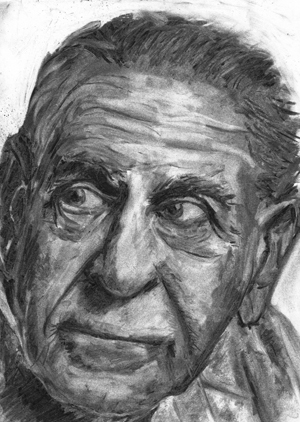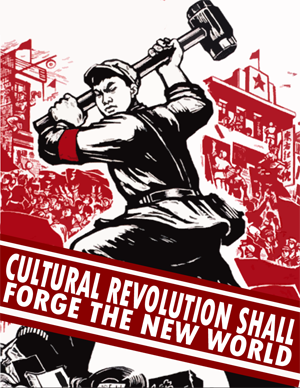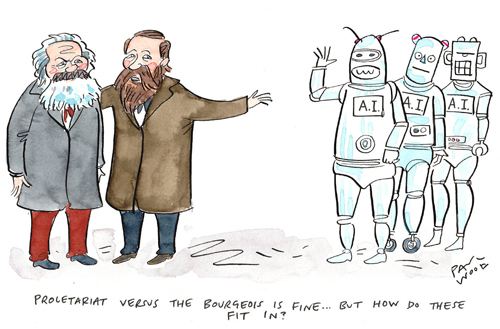
Your complimentary articles
You’ve read one of your four complimentary articles for this month.
You can read four articles free per month. To have complete access to the thousands of philosophy articles on this site, please
Question Marx
Popper on Marx on History
Chris Christensen considers a clash of two colossal Karls.
Karl Popper (1902-1994) was an Austrian-born philosopher of science who became a British citizen. He is famous for his falsification principle – the idea that the method of science is to try to show a scientific theorem to be false, thereby allowing a better hypothesis to be generated. A proposition can be shown to be false by even a single contrary observation. The classic example: the proposition ‘All swans are white’ was proven false when black swans were observed in Australia. But Popper’s greatest contribution to philosophy, in my opinion, is his attack on historicism – the idea that history has a pattern, a purpose and an ending, and that it moves inexorably toward that end according to certain laws. Popper dissected historicism in his 1957 book The Poverty of Historicism and went further into political philosophy and society in his two-volume work, The Open Society and Its Enemies (1962). This masterpiece of political philosophy, an exemplary case study in the art of polemics, is an ardent defense of liberal democracy. The philosophical enemies of an open society, thought Popper, included Plato, Hegel and Marx.

Sir Karl Popper
© Athamos Stradis 2019
Volume 1 concerns Plato, who viewed history not as progressing but cyclical, and currently regressing away from an ideal, golden age. In his Republic Plato advocated a social system ruled by philosopher-kings, protected by a military caste, and kept functioning by a large class of workers. Certain odious features of his political system, including infanticide, prompted Popper’s attack.
But we’re concerned here with Popper’s second volume, which discusses Hegel and Marx – especially Marx, although when discussing Marx and history, you can’t avoid Hegel. Indeed, Marx was deeply influenced by Hegel’s theory of historical development. Both thought that history has a purpose and a destiny, and that from the beginning, mankind has moved toward its destiny propelled by conflict through a relentless series of stages, each new stage brought into being through a conflict caused by a contradiction or negation of the previous stage. As the historical process moves forward, circumstances refine until the contradictions are finally resolved and a kind of freedom is reached.
Yet behind this similarity the two theories are at odds. Hegel’s theory of history, laid out in his Phenomenology of Spirit, is an abstraction; it unfolds mostly in the mind. Different movements of thought or belief conflict with each other, jointly giving rise to new movements which go on to conflict with yet others in a continuing process called the dialectic. World history is the unfolding of what called the Absolute Mind or Spirit (Geist) through this dialectic. In this sense the world is dependent on the mind, on ideas, and hence Hegel’s theory is called dialectical idealism. In its vague culmination, the individual experiences liberation through his relationship with the state, which Hegel glorified, writing that “The State is the Divine Idea as it exists on Earth.” (Hegel’s Lectures on the Philosophy of History, part 41).
Hegel’s idea of the historical process – the dialectic of contradictions – undoubtedly influenced Marx and Engels. A ‘brilliant’ new logic, said Engels of Hegel’s dialectics. But it had a problem. As Marx put it, “It is not the consciousness of men that determines their existence, but their social existence that determines their consciousness” (Critique of Political Economy, 1859). Marx’s theory, by contrast, is concrete; it unfolds in the world of work, so he calls it dialectical materialism. Its conflict is between economic classes, and its culmination arrives in the form of a classless society where labor is shared, along with its bounties. Eventually the state ‘withers away’.
Both men thought highly of Heraclitus, who flourished in the fifth century BC. Heraclitus said that everything was in a state of flux, forever changing through a law of nature he called Logos (logic or reason), driven by strife, or clashes of opposites – both of which aspects fit Hegel’s theory. But because Heraclitus was a materialist, Marx saw him as a harbinger of his own historical materialism.
Popper on Marx on History
Throughout his scrutiny of Marx, Popper treads a thin line between admiration and apprehension. He has respect for Marx: he finds him genuine in his beliefs, perceptive in his analysis, and sympathetic toward the downtrodden. Popper believed that Marx himself “made an honest attempt to apply rational methods to the most urgent problems of social life… His sincerity in his search for truth and his intellectual honesty distinguish him, I believe, from many of his followers…” It was Marxism that disturbed Popper, who called it “the purest, the most developed, and the most dangerous form of historicism.”
To Popper, the fundamental difference between Marx and the majority of historians (Hegel included), is that the others saw history and ‘the fate of man’ as determined by conflict between nations. Marx saw history as determined by conflict between classes. As Marx writes, “The history of all hitherto existing society is a history of class struggles” (Communist Manifesto). As Popper explains, “In [Marx’s] causal explanation of historical developments, including national wars, class interest must take the place of that allegedly national interest which, in reality, is only the interest of a nation’s ruling class.”

One’s class is determined by one’s position in the system of a society’s production of goods and services. In capitalism, the bourgeoisie own the means of production, and as such make up the ruling class. Those who actually do the work to produce the goods or services make up the working class, the proletariat. The owners are forced to increase productivity in order to compete, and so are compelled to force their workers to produce more, and more cheaply, which means at lower wages. They are also acutely aware that their own freedom depends on their emancipation from the productive process. They can “buy a greater degree of freedom only at the cost of enslaving other men,” writes Popper. “Only by making others do the dirty work can the rulers be free.” Yet as the workers are exploited, they develop class consciousness: recall that Marx thought that man’s social existence determines his consciousness. And so the workers become increasingly aware that their lack of freedom has been determined by their position in the means of production. The rulers are bound to enslave the ruled; and the ruled are bound to fight against the rulers. “Thus all, rulers as well as ruled, are caught in the net, and forced to fight one another,” Popper explains. “It is this bondage,” he adds, “this determination, which brings their struggle within the reach of… scientific historical prophecy.” Popper sums up Marx’s determinism by saying that the class relations that characterize the social system are independent of the individual man’s will.
All this seems terribly impersonal – removed from the brutal reality of everyday life. But Marx saw first-hand the flesh and blood cruelty of unfettered capitalism in England in the middle of the nineteenth century. Marx gives these examples in Capital:
“William Wood was 7 years old… when he began to work… he came to work every day in the week at 6 a.m., and left off about 9 p.m… ‘Fifteen hours of labor for a child 7 years old!’ exclaims an official report of the Children’s Employment Commission of 1863. Mary Anne Walkley had worked without pause 26-and one-half hours, together with sixty other girls, thirty of them in one room… A doctor, called in too late, testified before the coroner: Anne Walkley had died from long hours of work in an overcrowded workroom.”
Prophecy & The Paradox of Freedom
Popper connects the extreme conditions of Victorian capitalism to the prevailing view of economic freedom: “This shameless exploitation was cynically defended by hypocritical apologists who appealed to the principle of human freedom, to the rights of man to determine his own fate, and to enter freely into any contract he considers favorable to his interests.”
The paradox of freedom is a concept dating from Plato which says (bluntly) that ‘unlimited freedom leads to no freedom’. Popper applied this paradox to two types of freedom – physical and economic. “Freedom in either realm defeats itself if it is unlimited,” he wrote. Unconstrained physical freedom is the freedom of the bully to harm the weak. But eventually, that bully will come up against a stronger bully, and that bully too will encounter another, and so on. So it is necessary for the state to limit personal freedom in certain legal ways in order to protect everyone’s freedom. Unrestrained economic power can bring the same result, in the economic sphere. “In such a state, the economically strong is free to bully one who is economically weak, and to rob him of his freedom,” writes Popper. For example, “Those who possess a surplus of food can force those who are starving into a ‘freely’ accepted servitude.” So it is also necessary for the government to protect the economically weak. Popper argued that the state could build institutions to provide this protection through legal means. He called this ‘piecemeal social engineering’.
Marx however considered politics and the legal system to be the handmaidens of the ruling class. He held that bourgeois political systems denied substantial freedom to workers and the poor. Although they were couched in the language of justice and freedom, this was mere window dressing. Popper, in expressing Marx’s belief about this, wrote, “This shows that exploitation is not merely robbery. It cannot be eliminated by merely legal means.” For Marx, the only alternative was revolution.
According to Marx’s economic historicism, the social system of one historical period must obliterate itself to produce the next historical period. This is how feudalism gave birth to capitalism. Capitalism, in turn, contains the seeds of its own destruction. Those seeds are found in the conditions of production. In Capital, Marx claimed there would be an increasing concentration of wealth in ever fewer hands, and a corresponding increase in misery among the growing working class. This is the first step of three in Marx’s prophecy of revolution. This trend would then bring about the second step, containing two results. As Popper puts it, explaining Marx’s theory: “all classes except a small ruling bourgeoisie and a large exploited working class are bound to disappear or to become insignificant”; and also “The tension between these two classes must lead to a social revolution” through conflict between the owners and the workers. Finally, in a third step, the workers would emerge as victors over the owners, and establish what Marx called the dictatorship of the proletariat. For Marx this dictatorship is necessary to defend against a counter-revolution and to bring about the classless society.
Marx thought this historical process inevitable. This is the historicism that Popper found dangerous, and this is where he separates himself from Marx. Popper bluntly invokes the paradox of freedom to counter the conditions necessary for Marx’s ‘inevitable’ revolution:
“We must construct social institutions, enforced by the power of the state, for the protection of the economically weak from the economically strong… We must demand that unrestrained capitalism give way to an economic interventionism. And this is precisely what has happened. The economic system described and criticized by Marx has everywhere ceased to exist.”
Popper gives examples of what has happened in limiting the absolute freedom of the market as it was in Marx’s day: the limiting of work-hours; protections against sickness and disability; unemployment insurance; progressive taxation; the rise of labor unions, and the like. Popper writes that Marx “never grasped the paradox of freedom, and that he never understood the function in which state power could and should perform in the service of freedom and humanity.” I should stress that Popper was not naïve concerning state power and the possibility of tyranny. “State intervention,” he wrote, “should be limited to what is really necessary for the protection of freedom.” Acutely aware of human psychology, Popper stressed the importance of controlling the controllers, be they state functionaries or economic moguls. In fact, most Western countries have established checks and balances of legal frameworks to limit the power of the state as well as the absolute freedom of the market.

© Paul Wood 2019 woodtoon.co.uk
The End of Historicism
The reason Marx failed as a prophet “lies entirely in the poverty of historicism” writes Popper: “in the simple fact that even if we observe today what appears to be a historical tendency or trend, we cannot know it will have the same appearance tomorrow.” Popper further declaims, that when people talk about the history of mankind, “what they mean, and what they have learned about in school, is the history of political power. There is no history of mankind; there is only an indefinite number of histories… And one of these is the history of political power. This is elevated into the history of the world. But this I hold is an offence against every decent conception of mankind… For the history of power politics is nothing but the history of international crime and mass murder.” To illustrate this Popper cites the Russian revolution and its building of an industrial state by the use of forced labor and the brutal suppression of dissent.
In the conclusion of The Open Society and Its Enemies, Popper once again displays his ambiguity towards Marx. “Marx misled scores of intelligent people into believing that historical prophecy is the scientific way of approaching social problems.” Nonetheless, he calls Marx’s work “a grandiose philosophic system, comparable or even superior to the holistic systems of Plato and Hegel. Marx was the last of the great holistic system builders. We should take care to leave it at that, and not to replace his with another great system.”
I would like to make two comments in closing. First, I think Popper, who died in 1994, would be alarmed by the recent rise of extreme nationalism in Europe and the United States, and would also lament the widening gap between the rich and the poor. Both could prompt a resurgence of Marxism or other authoritarianisms – an emergence that Popper would counter with more piecemeal social engineering.
Finally, an observation regarding Hegel and Marx. Modern philosophers sometimes seek support from the early Greeks to give their theories the sheen of ancient wisdom. Hegel and Marx both found their sage in Heraclitus. Hegel was ecstatic about him: “Here we see land!” he exclaimed. “There is no proposition of Heraclitus which I have not adopted in my logic… All things come to pass according to conflict”; while Marx saw him as a precursor of his own dialectical materialism. But Heraclitus differed from these two historicists on one absolutely crucial point: he offered no prophecy, no exalted culmination of history. As the philosopher William Sahakian put it in his History of Philosophy (1968): “Heraclitus regarded the world as a ceaselessly changing system, never complete or final in the sense of reaching its goal or coming to a stop in a state of perfection.”
© Chris Christensen 2019
Chris Christensen is a delivery driver in Portland, Oregon, where he studies philosophy and takes lessons in algebra from his wife, Bobbie.









